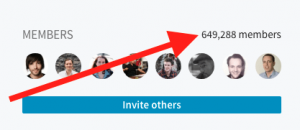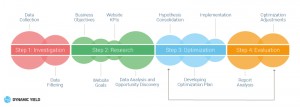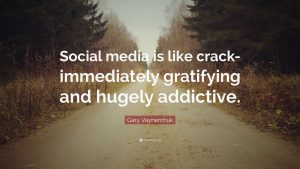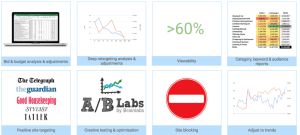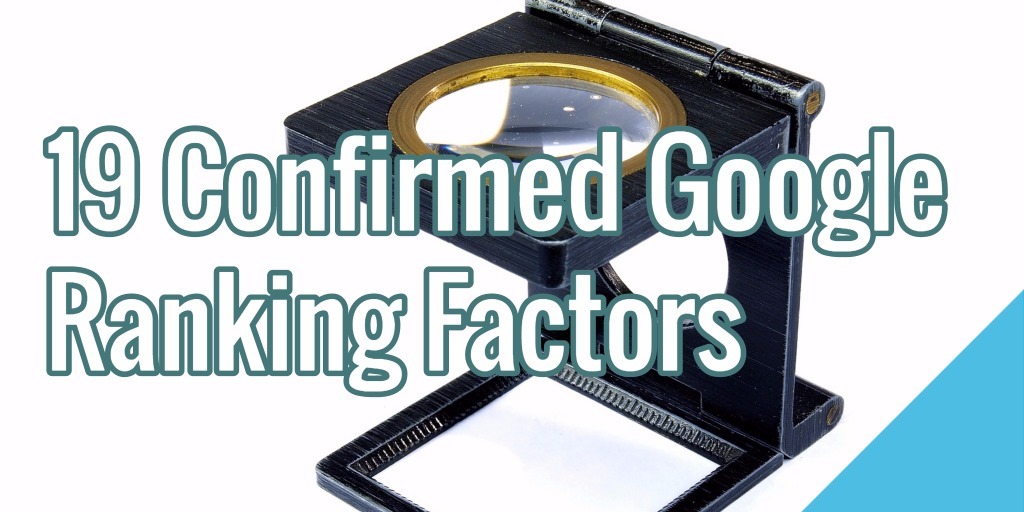
For many websites and businesses Google continues to provide more traffic to their website than any other channel: more organic visitors than paid search, social and even direct traffic.
With that in mind it’s certainly worth keeping up-to-date with what works, what doesn’t work, what Google has said and how to avoid a dreaded penalty.
This article looks at the ranking factors Google has confirmed in the hope of helping to increase your business’ prominence on the web.
Positive Factors:
No one will be surprised to see links make it on the list. Link building has been a big business for many a year now.
Earlier this year, in a Q&A with Google, Search Quality Senior Strategist at Google Andrey Lipattsev confirmed that two of the top three ranking factors were ’content’ and ’links’:
“I can tell you what they are. It is content. And it’s links pointing to your site.”
So what specifically is it about content and links that helps ranks your website in Google’s Search Engine Results Pages (SERPs)?
Links
Quality
The quality of your inbound links is a huge factor with Google. A company or website with a small backlink profile can see a huge boost from just one link from an authoritative page on an authoritative website.
Google PageRank died in importance some years ago. These days I use Majestic’s Trust Flow score as it gives us a greater idea of authority sites from the regular sites. Or the difference between regular sites and the low-quality and spammy sites.
Quantity
It’s all well and good getting a link from one authoritative site but the more you get the better your site will rank.
This is not suggesting build links for the sake of numbers – I certainly wouldn’t recommend directory links or junk comments for the sake of increasing the number of links. However, if you had one link from a news story from an authoritative site recently, such as a news site, it may naturally be picked up by other sites, but also it presents you with an opportunity to get links from smaller news sites, publications and blogs from the same story.
And just because you got a story in a certain publication once doesn’t mean you can’t or shouldn’t go back to them in the future.
Anchor Text
Anchor text used to be the be-all-and-end-all of ranking a website many years ago, as stated in Google’s original algorithm:
“First, anchors often provide more accurate descriptions of web pages than the pages themselves.”
Whilst anchor text isn’t as strong a factor as it was a few years ago, it does still play a big role in ranking websites and webpages. One expects this to lessen over time but for now it’s still important to get some anchor text links to your website.
Don’t overdo it though – a natural backlink profile is made up with a majority of brand name and URL anchor text links.
Here’s an example of a keyword jumping from page 10 to page 2 off the back of one anchor text link in September 2016:

Screenshot of Authority Labs data showing a keyword jumping from position 99 to 18 and maintaining that ranking
Internal Links
Internal links also play a big role in your rankings. If you have lots of good links pointing to a specific page, or a number of pages, you should consider passing this onto your product pages if they need a boost in the SERPs. Though please do make it user-friendly.
Last month we shot up from page 4 to position 7 (page 1) for our own website by adding a couple of internal links from popular, relevant blog posts on our website. Though it has since dropped down to page two:

Looks like we need some external links pointing to this keyword!)
Content
Andrey Lipattsev also mentioned content as one of the top three factors when Google comes to ranking a site.
Getting the content right on your page can certainly play a big role in where you rank in Google’s SERPs so here are a few things to bear in mind when it comes to content as a ranking factor:
Title Tag
It’s still a very important ranking factor to have your keyword(s) in the title tag. Not only because it weighs heavily when Google is determining where to rank your site for specific searches, but also to help attract click-throughs to your website. Someone that has searched your target keyword and sees it in your page title, particularly at the beginning, is more likely to visit your website than if it wasn’t there at all.
We switched focus on our target keywords last month and here is one of the results we achieved just by changing the page title:

Screenshot of Authority Labs data showing a keyword jumping from position 54 to 5 after changing page title
Heading Tags
Heading tags also have some weight when it comes to ranking your website and it’s important to get your keyword(s) in the H1 where possible on your pages.
It is recommended that you only use one H1 per page though there is no harm in using H2s, H3s, etc. as well.
Content Length
Since the Google Panda algorithm update back in February, 2011 it became very noticeable how seriously the search engine takes the content on a given page.
Those of you who were working in SEO six or more years ago may remember how you could rank websites and webpages with thin content thanks to their backlinks. It’s not the case these days.
It’s more and more the case now that the top results in Google are in-depth articles. An interesting result I came across for ‘fx trading’ recently is that most of the top organic results are information pages and not the homepage or target page that fx companies would aim first-time users to land on:
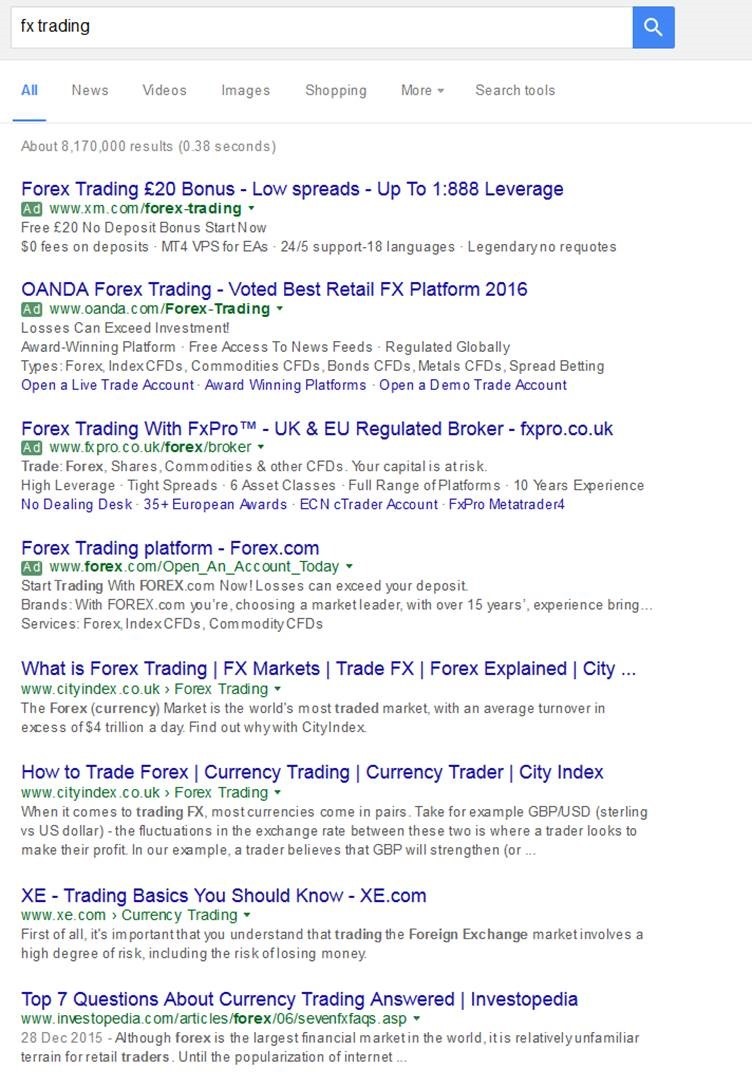
This is a keyword that Google suggests bidding £38.98 ($65 CAD) in AdWords!

URLs
Making sure to include your keyword in the URL slug of your page also helps with ranking. If your keyword is already in the page title as advised then there’s no reason why you won’t have it in your page URL too.
Google continues to bold keywords within your URL that match search queries which help your listing stand out:
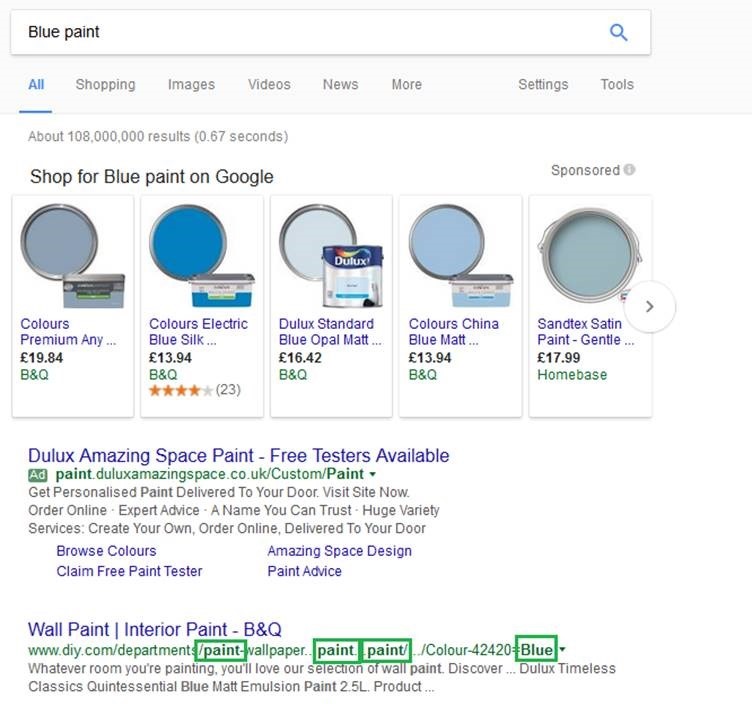
RankBrain
Completing the top three ranking factors in Google SERPs, a news piece published by Bloomberg last October quoted a Google senior research scientist, Greg Corrado, confirming RankBrain’s importance:
“RankBrain is one of the ’hundreds’ of signals that go into an algorithm that determines what results appear on a Google search page and where they are ranked,” Corrado said. “In the few months it has been deployed, RankBrain has become the third-most important signal contributing to the result of a search query.”
RankBrain is Google’s AI system that helps it process search results to provide more relevant results for its users. It works by guessing what words might have a similar meaning so it can filter the results according.
Other Positive Ranking Factors
Google has confirmed the following ranking factors. Although they are not in the top three we certainly believe these have a big influence on your rankings and should be taken into consideration when optimising your website:
Page Loading Speed
All the way back in April, 2010 Google confirmed that page loading speed was one of their search ranking factors; how quickly a website responds to web requests.
This isn’t just useful for helping your site rank better but for the users’ experience too. Ever been frustrated over the time it takes a website or webpage to load? Imagine your website loading slowly for first-time users and how this could put them off making a purchase or enquiry to your business?
Secure Website
In August, 2014 Google confirmed it was starting to use HTTPS as a ranking signal. Since then the web is now fill of https:// websites. How significant a factor it is as a ranking factor is anyone’s guess but Google claimed two years ago that they were seeing positive results following a test.
A secure website is also a trust signal to users. They are more likely to place an order through your website if you have a secure site than with a non-secure site.
Negative Ranking Factors
As well as proving that some of our efforts are positive towards ranking a website highly in Google, the search engine giant has also been able to confirm other factors that may have a negative effect on your positions within the results:
Manual Penalty
Manual penalties are Google’s way of removing or demoting your website or individual webpages. Those who have suffered a manual penalty from Google are notified via a message in Search Console if they have it set up.
These penalties are not related to algorithm additions such as Penguin or Panda but are Google manually judging and punishing websites themselves. This is usually a result of underhand behaviour such as trying to manipulate Google’s SERPs.
In September, Search Engine Watch published a list of 12 well-known businesses that have been hit with a manual penalty from Google over the years. When the Washington Post, WordPress and BBC are being hit by penalties from Google, no website is safe!

Penguin Penalty
Google first introduced the Penguin algorithm update in April, 2012 to devalue the impact of low-quality backlinks. This resulted in some websites and webpages being demoted in Google’s SERPs and some even being kicked out altogether.
For the nearly four-and-a-half years of its existence, websites could only recover from Penguin after both cleaning up their backlink profile and waiting for Google to manually refresh their results. As of 23 September, 2016 Penguin is now real-time meaning you can be hit or recover within days.
It has been questioned whether sites ever fully recover from a Penguin penalty so it’s certainly worth avoiding any underhand activity to put yourselves at risk – no one wants their website or business kicked out of Google.
Panda Penalty
The Google Panda update was released in February, 2011 with the aim of hitting sites with low-quality or thin content. This was the start of a big shift with Google providing higher-quality results and not just those with a large number of links.
Shortly after the algorithm was rolled out Google received lots of questions on their support forum, which may have resulted in them releasing a 23-bullet point guide on building high-quality sites.
The quality of content and the length of content for sites ranking at the top of the SERPs for popular keywords has noticeably increased over the past couple of years following the original Panda rollout.
Buying Or Selling Links
Google lists “Buying or selling links that pass PageRank. This includes exchanging money for links, or posts that contain links; exchanging goods or services for links; or sending someone a “free” product in exchange for them writing about it and including a link” on its Link Schemes page.
I’ve certainly heard of more and more websites getting messages from Google about unnatural links within their content. Here’s an example of the message some webmasters have received in their Search Console accounts:
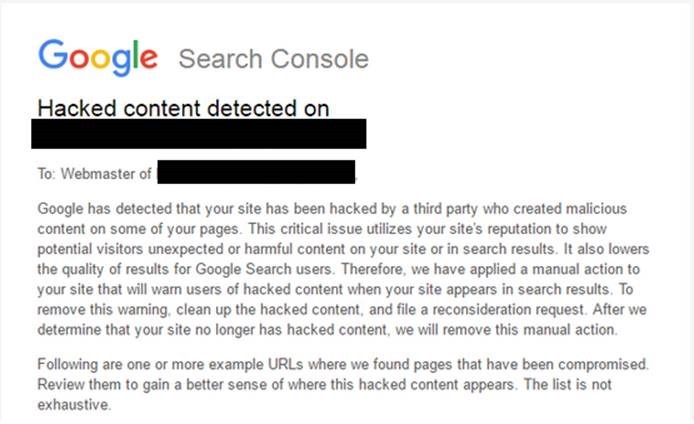
Reciprocal Links
Google has stated that “Excessive link exchanges (“Link to me and I’ll link to you”) or partner pages exclusively for the sake of cross-linking” are to be avoided.
You’re taking a big risk by having a ‘links page’ on your website these days: something that was common more than five years ago was for sites to exchange links with each other.
Article Marketing
Also on the Google Link Schemes page is: “Large-scale article marketing or guest posting campaigns with keyword-rich anchor text links”.
At the start of 2014, then head of the Google web spam team, Matt Cutts published a blog on his website announcing the decline in the benefit from guest posting. Within his article Mr Cutts went on to explain how guest posting had turned from something respectable into pure out spam solely with the intention of increase your website’s rankings within Google.
Press Releases
Press releases aren’t a no-no, but Google has stated that you should avoid any optimised anchor text links within them.
Submitting a release to the wire with optimised anchor text links is straightforward for Google to pick up.
Directories And Bookmarks
The search engine giant disapproves of ’Low-quality directory and bookmark site links’.
These link building methods remain popular though, perhaps because they’re cheap and used to work. I certainly wouldn’t advise this approach in the year 2016 or beyond.
Widgets
Optimised anchor text links on a widget should also be avoided if you want to avoid the wrath of Google.
Footer Links
Google doesn’t react too kindly to “Widely distributed links in the footers or templates of various sites” either.
Forum Comments
What used to be a popular link building tactic, Google acts negatively on “Forum comments with optimised links in the post or signature.” Presumably the same can be said of optimised anchor text left in comments on websites too.
Interstitials Or Distracting Ads
As of 10 January 2017, Google will start to demote pages that display intrusive interstitials and annoying ads on mobile devices. The theory is that they provide a poorer experience to users.
Whilst this is initially rolling out on mobile you can expect it to negatively affect desktop sites as well later in the year.
DMCA Complaints
Since August, 2012 Google has been lowering websites in their search results that they have received valid copyright removal notices for. Their official word back then was “Sites with high numbers of removal notices may appear lower in our results” but Google now removes pages entirely, though does still display a message to notify the search user:
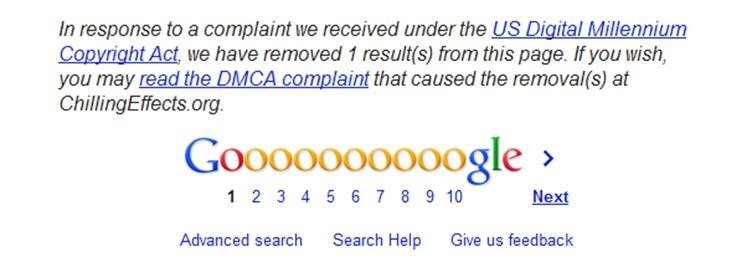
Duplicate Content
Google states that: “In the rare cases in which Google perceives that duplicate content may be shown with intent to manipulate our rankings and deceive our users, we’ll also make appropriate adjustments in the indexing and ranking of the sites involved.” Basically, your site won’t appear in their results if they believe you were intentionally duplicating content to rank.
Google provides plenty of useful documents containing advice and support to give you an idea how to drive organic traffic to your website and also helping you to avoid making any bad choices when attempting to rank your website within their search engine.
The Webmaster Support pages also have plenty of useful advice and a link to Google’s popular support forum where webmasters and such try to offer advice and help of their own.
If you need any help with your information feel free to get in touch!
* Adapted lead image: Public Domain, pixabay.com via getstencil.com
19 Confirmed Google Ranking Factors
The post 19 Confirmed Google Ranking Factors appeared first on Search Engine People Blog.
Search Engine People Blog(70)


